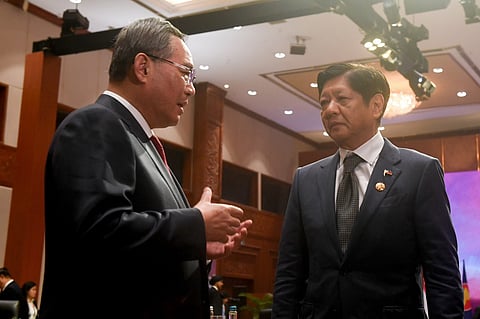
- NEWS
- the EDIT
- COMMENTARY
- BUSINESS
- LIFE
- SHOW
- ACTION
- GLOBAL GOALS
- SNAPS
- DYARYO TIRADA
- MORE

JAKARTA, Indonesia – President Ferdinand Marcos Jr. called for the early conclusion of an effective and substantive Code of Conduct in the South China Sea.
During his intervention in the 26th Association of Southeast Asian Nations (ASEAN) – China Summit here, Marcos reaffirmed the Philippines' commitment to the rules-based order in the South China Sea.
"The Philippines continues to uphold the primacy of the 1982 UN Convention on the Law of the Sea as the framework within which all activities in the seas and oceans are conducted," Marcos said. "We once again reaffirm our commitment to the rule of law and peaceful settlement of disputes."
Marcos also expressed hope that the two countries can progress in the negotiations for a COC in the South China Sea.
"The early conclusion of an effective and substantive COC that is in accordance with international law, including the 1982 UNCLOS, remains the goal for ASEAN and for China," he said.
Marcos' remarks come amid rising tensions in the South China Sea, where China has been asserting its claims over disputed waters. The Philippines is one of several ASEAN countries with overlapping claims with China in the South China Sea.
In his remarks during the intervention, Marcos also highlighted the importance of cooperation between ASEAN and China in areas such as trade, investment, and connectivity. He said that such cooperation can help to achieve the goal of making ASEAN the "epicentrum of growth."
"The ongoing ASEAN-China Free Trade Area 3.0 Upgrade Negotiations will also encourage stronger ties between ASEAN and China," Marcos said. "It is also our hope that we identify and leverage on complementarities between China's Belt and Road Initiative and the ASEAN Outlook on the Indo-Pacific."
Chinese Premier Li Qiang, for his part, claimed that China has been working with the Association of Southeast Asian Nations (ASEAN) to "preserve regional stability."
He asserted that "mutual trust" between the two parties has "grown deeper."
"We have been committed to treating each other sincerely, and our political mutual trust has grown deeper," Li said during the ASEAN-China Summit.
"No matter how the international situation evolves, China and ASEAN have maintained close exchanges and communication, respecting each other's development path," he said.
China, which has emphasized that regional parties should be in charge of resolving disputes like those involving the South China Sea, has stated that "the China-ASEAN cooperation has come a long way" due to their shared "understanding about hardships."
Chinese ships obstructed Philippine resupply ships in the Philippines' exclusive economic zone in August by using water cannons.
The Hague-based international arbitration court received a complaint from Manila in 2013 against Beijing, but China ignored the proceedings there as well.
Beijing has continued rejecting the judgment rendered in that case in 2016, and in July it charged the US with being the "mastermind" behind the Philippines' lawsuit.
